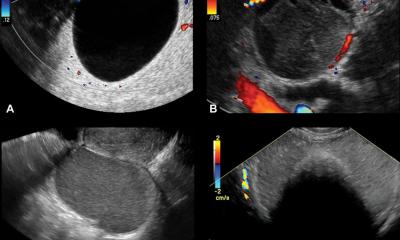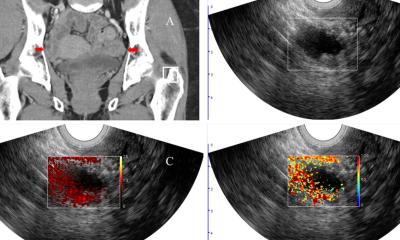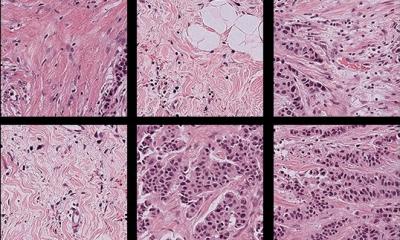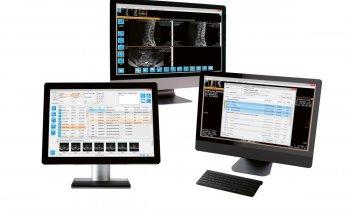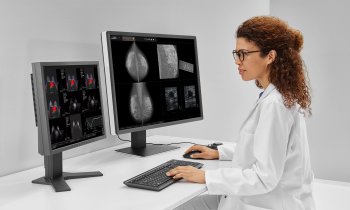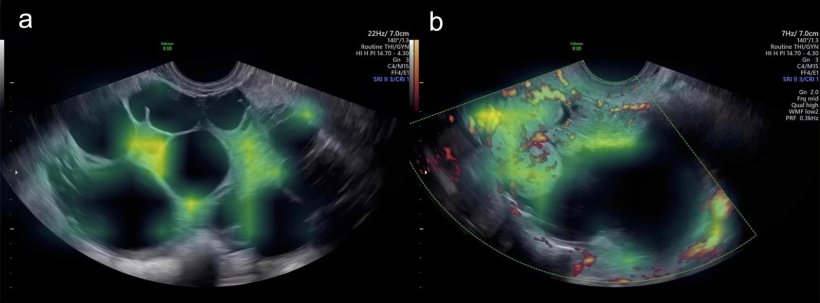
Image source: Christiansen F, Konuk E, Ganeshan AR et al., Nature Medicine 2025 (CC BY 4.0)
News • Ultrasound-based lesion detection
Ovarian cancer diagnosis improved by AI
A new international study led by researchers at Karolinska Institutet in Sweden shows that AI-based models can outperform human experts at identifying ovarian cancer in ultrasound images.
The study is published in Nature Medicine.
“Ovarian tumours are common and are often detected by chance,” says Professor Elisabeth Epstein at the Department of Clinical Science and Education, Södersjukhuset (Stockholm South General Hospital), at Karolinska Institutet and senior consultant at the hospital’s Department of Obstetrics and Gynecology. “There is a serious shortage of ultrasound experts in many parts of the world, which has raised concerns of unnecessary interventions and delayed cancer diagnoses. We therefor wanted to find out if AI can complement human experts.”
AI-based tools can be an integral part of tomorrow’s healthcare, relieving experts and optimising hospital resources, but we need to make sure that they can be adapted to different clinical environments and patient groups
Filip Christiansen
The researchers have developed and validated neural network models able to differentiate between benign and malignant ovarian lesions, having trained and tested the AI on over 17,000 ultrasound images from 3,652 patients across 20 hospitals in eight countries. They then compared the models’ diagnostic capacity with a large group of experts and less experienced ultrasound examiners. The results showed that the AI models outperformed both expert and non-expert examiners at identifying ovarian cancer, achieving an accuracy rate of 86.3%, compared to 82.6% and 77.7% for the expert and non-expert examiners respectively. “This suggests that neural network models can offer valuable support in the diagnosis of ovarian cancer, especially in difficult-to-diagnose cases and in settings where there’s a shortage of ultrasound experts,” says Professor Epstein.
The AI models can also reduce the need for expert referrals. In a simulated triage situation, the AI support cut the number of referrals by 63% and the misdiagnosis rate by 18%. This can lead to faster and more cost-effective care for patients with ovarian lesions.
Despite the promising results, the researchers stress that further studies are needed before the full potential of the neural network models and their clinical limitations are fully understood. “With continued research and development, AI-based tools can be an integral part of tomorrow’s healthcare, relieving experts and optimising hospital resources, but we need to make sure that they can be adapted to different clinical environments and patient groups,” says Filip Christiansen, doctoral student in Professor Epstein’s research group at Karolinska Institutet and joint first author with Emir Konuk at the KTH Royal Institute of Technology.
Recommended article

Article • Technology overview
Artificial intelligence (AI) in healthcare
With the help of artificial intelligence, computers are to simulate human thought processes. Machine learning is intended to support almost all medical specialties. But what is going on inside an AI algorithm, what are its decisions based on? Can you even entrust a medical diagnosis to a machine? Clarifying these questions remains a central aspect of AI research and development.
The researchers are now conducting prospective clinical studies at Södersjukhuset to evaluate the everyday clinical safety and usefulness of the AI tool. Future research will also include a randomised multicentre study to examine its effect on patient management and healthcare costs.
The study was conducted in close collaboration with researchers at the KTH Royal Institute of Technology and was financed by grants from the Swedish Research Council, the Swedish Cancer Society, the Stockholm Regional Council, the Cancer Research Funds of Radiumhemmet and the Wallenberg AI, Autonomous Systems and Software Program (WASP).
Elisabeth Epstein, Filip Christiansen and three co-authors have applied for a patent through the company Intelligyn for methods of computer-supported diagnostics. Elisabeth Epstein, Filip Christiansen and Kevin Smith, researcher at the KTH Royal Institute of Technology, also own shares in Intelligyn, for which Professor Epstein is an unsalaried manager. See the paper for a full list of conflicts of interest.
Source: Karolinska Institutet
03.01.2025



